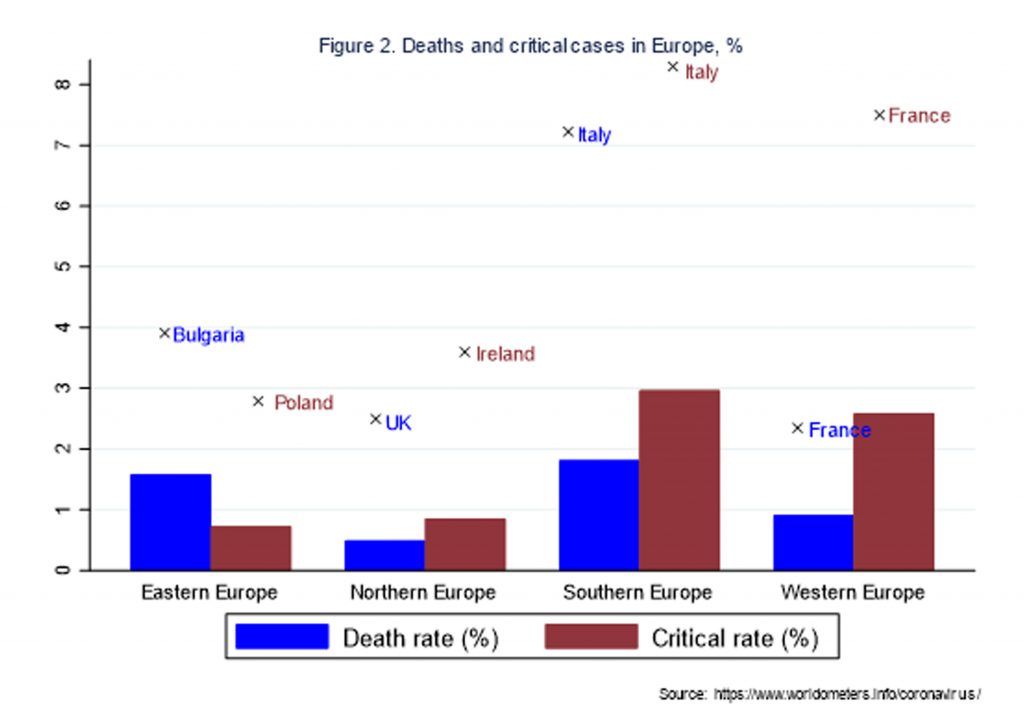Based on 28 European countries with at least one million citizens, Professor George Saridakis provides some preliminary socio-economic and demographic insights into the coronavirus disease in Europe.
Although Southern European countries seem to have more total coronavirus cases (see Figure 1), estimates per capita (mean average) show that Southern Europe, Northern Europe, and Western Europe are statistically no different from each other (even after allowing for heterogeneity). However, Italy is the most affected European country followed by Switzerland that has the second highest per capita coronavirus case rate.
Figure 2. shows the ‘death rate’ (the number of deaths divided by the number of cases) and ‘critical rate’ (the number of critical cases divided by the number of active cases) in Europe.
Until now, the average death rate varies between 0 to nearly 7 per cent but these rates do not differ substantially across the European regions. If we examine the ‘critical rate’, a gap starts to appear and it varies among countries from 0 to above 8 percent, with Southern Europe having a significantly higher rate than Eastern and Northern Europe.
Are certain regions more likely to have a case of coronavirus?
After controlling for socio-economic and demographic characteristics, the data shows that other European regions are as likely as Southern Europe of having a case.
Which socio-economic and demographic factors matter?
Some of my preliminary findings, tend to suggest the following:
- The wealthier the EU country the higher the likelihood of having a case. Perhaps this is because its citizens are more likely to be informed and report the symptoms, and perhaps have a diagnosis from a medical expert. Additionally, its citizen may have more social interactions and closeness though increased consumption of goods and services, lifestyle activities etc.
- Countries with a low unemployment rate face a lower probability of being at risk. Higher rates of unemployment, for example, may be related to hypertension and other medical conditions, which may increase vulnerability to the virus. In addition, unemployment may increase the likelihood of young unemployed people (potential carriers of the virus) living with older relatives, with the latter group being more vulnerable to the virus.
- EU countries with an older (on average) population are most at risk, and age seems to be a strong predictor of being at risk.
- Educated people are more likely to be aware and take precautions (suggesting a potential negative effect), but are also more likely, for example, to have higher incomes and thus higher lifestyle exposure (suggesting a potential positive effect). Hence, the two opposite effects may cancel each other out.
- Countries with negative net migrations (i.e. proxy of mobility transition) seem to have a lower risk than countries with a positive one.
- There appears to be no significant differences in coronavirus cases between populations in urban and rural locations. Hence, awareness of people in both urban and rural areas is important as well as a lifting of hospitalization restrictions is necessary for a timely diagnosis of the disease and treatment.
- Finally, most religious affiliation/groups are found to make no difference in the probability of having a case.
Are there any potential measures to be considered by policy makers?
There are various measures that government has already taken and/or is currently considering to reduce the spread of the virus. In my view, some key measures are:
- Control tourist arrivals and destinations from and to high-risk countries.
- Regulate immigration and strengthen border controls with health checks.
- Adopt tailored measures to support the elderly population (within residential and nursing care homes), and individuals with pre-existing medical conditions in their daily needs and activities.
- Inform individuals, households and firms about keeping hygiene standards, precautions and safeguarding within and outside workplaces, and provide services for advice and emotional support.
- Keep a social distance at work when possible and encourage working from home and in cyberspace.
- Minimise face-to-face consumption and transactions (e.g. encourage online shopping and transactions) and provide high-tech support to private businesses and public organisations.
- Support the supply chain for necessity goods, hygiene products and medicine, and calm consumers fears.
- Equip public places, institutions and transportation’s with hand sanitiser dispensers (hard to find in shops now!) and ventilation systems, and increasing cleaning procedures provide a clear hygiene etiquette.
- Support hospitals needs in terms of staff and equipment and coronavirus testing centres for timely diagnosis and patient treatment.
- Contribute to the global scientific effort and collaborate for reducing the spread of the virus until a vaccination is available. This necessitates a co-ordinated strategy and policy across regions and worldwide. Coronavirus does not recognise local, national or regional boundaries and our response should take this into account.
Is coronavirus going to affect the economy?
Coronavirus is likely to affect the economy as it spreads and may have a significant impact on various sectors and firms (due to supply and demand shocks) and affect the financial circumstances of individuals, particular small firms and the self-employed. Hence, a recession is quite likely to hit the economy, and thus a fiscal stimulus, along with further monetary easing measures, are needed to fight a financial epidemic. Government and institutions should respond by supporting firms, especially the self-employed and small firms, and vulnerable individuals/households over potential loss of profit and wages.
The coronavirus outbreak raises important challenges and threats for the UK and the global economy, however, in my view, we should prioritise health and safety. Leaving it to a ‘herd community response’ with few other interventions, is a surrender of leadership and a diminished capability to control the virus.
Although, the data suggests that young people are relatively resilient, they are not immune and thus, we should not underestimate the potential risks to them. We all have responsibility to act fast and responsibly, follow medical guidance and advice, and support the medical experts in their outstanding attempt to fight the virus and offer their service to those in need.
For more information on our MSc programmes such as International Business Management, Healthcare Management or Management please view our programme pages in the links provided.




Very interesting analysis. The study has uncovered some new and original insights. Perhaps another useful variable to add is “weather”, as it seems colder countries seem to be more affected. It’ll Also be useful to extend the study to include African and Asian countries to see if the findings remain the same or differ by region or continent.
This is a very interesting article, which I enjoyed reading. It offers a penetrating analysis of socioeconomic and demographic factors. It raises very important points and offers sensible suggestions for policy making.